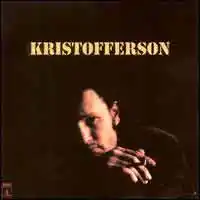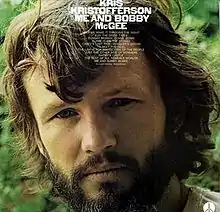Kristofferson (album)
Kristofferson is the first album by Kris Kristofferson, released in April 1970[1] on Monument Records. It was re-released under the title Me and Bobby McGee in 1971 immediately following the success of Janis Joplin's interpretation of that song and the success of Kristofferson's second album, The Silver Tongued Devil and I. It became a hit upon re-release. In 2001, the album was re-released on CD with four bonus tracks.
| Kristofferson | ||||
|---|---|---|---|---|
 | ||||
| Studio album by | ||||
| Released | April 1970 | |||
| Recorded | 1969 | |||
| Studio | Monument Recording Studio, Nashville, Tennessee | |||
| Genre | Country | |||
| Length | 41:29 | |||
| Label | Monument | |||
| Producer | Fred Foster | |||
| Kris Kristofferson chronology | ||||
| ||||
| Me and Bobby McGee | ||||
 1971 re-release cover | ||||
Many of the songs on the album were already hits as they had been recorded by other artists when Kristofferson was primarily known as a songwriter. In spite of this, the album was initially a commercial disappointment, although it reached number 10 on the country album charts.
Background
By 1970, Kristofferson, who had turned his back on a military career to pursue songwriting much to the dismay of his family, had made a name for himself within Nashville’s artist community. In 1966, Dave Dudley had a successful single with the Kristofferson-penned "Viet Nam Blues", and in 1969 his song "From the Bottle to the Bottom" was recorded by Billy Walker and it made the country Top 20. In 1969, Roger Miller was the first artist to officially release a version of "Me and Bobby McGee", and it rose to number 12 on the U.S. country chart. Kristofferson was part of an emerging coterie of new songwriters, such as Mickey Newbury and Shel Silverstein, who sought to bring a poetic realism to country music, and in the next few years many of the songs that appear on Kristofferson's debut would be recorded by scores of artists, including Johnny Cash, Janis Joplin, Waylon Jennings, Jerry Lee Lewis, Ray Price, Willie Nelson, and Gordon Lightfoot.
Recording and composition
Kristofferson had released a single in 1967 on Epic Records called "Golden Idol/Killing Time", which was unsuccessful, and it was not until he played several of his best songs to producer Fred Foster that the idea for an LP came about. In Stephen Miller's 2008 book Kristofferson: The Wild American, Foster recalls:
He was real nervous; he didn’t fancy himself as much of a singer. He was finding confidence in himself as a writer. I think he basically knew he was a great writer, but he hadn’t proven it yet. The reason I asked him to sing four songs is any songwriter might luck up and write one great song, never more than two or three and certainly never four…I imagine by the time he was somewhere in the middle of his second song, I was almost in shock.[2]
Miller also recounts that when Foster suggested recording an album, Kristofferson protested, "Man, I can't sing, I sing like a frog", to which Foster replied, "Yeah but a frog that can communicate, cos you just sold me." Since he did not have a band at the time, the musicians were rounded up in a hurry, so the production and instrumental work were unsophisticated, with little attention given to virtuoso lead breaks or flourishes, but this austerity was balanced out by the diversity of the material, being a melange of country, rock, and folk. In his book Outlaw: Waylon, Willie, Kris, and the Renegades of Nashville, Michael Striessguth writes of the album, “Produced with session musicians outside A-class circles, it communicated eclecticism and spontaneity: talking blues appeared next to tender ballads next to unhinged jams.”[3]
The title for “Me and Bobby McGee” was suggested to Kristofferson by Foster, who received a co-writing credit from the singer as a thank you, and was partly inspired by the Fellini film La Strada.[4] Commenting on the song's famous chorus “Freedom’s just another word for nothing left to lose…” Kristofferson later observed, “It definitely expressed the double-edged sword that freedom is. You may be free but it can be painful to be that free. But maybe at the very end, when you leave, you will be free when you’ve nothing else to lose, you know, when you’re gone.”[4] The forlorn “Sunday Morning Comin' Down” had been a hit for Ray Stevens in 1969 on both the country and pop charts, and was one of a number of timeless classics Kristofferson wrote in a short space of time, the words evoking an image of timeless poignancy, describing one man’s experience of alcoholism, failure, loss of family and religion in a way that countless numbers of people could identify with[5] In the episode “Beyond Nashville” in the 2003 documentary Lost Highway, Kristofferson admits, “Well it was straight autobiography for me. I was living in a condemned apartment and had lost my family, and Sunday was a day when the bars were closed, and, uh…it was not a day to be alone.” While “Sunday Morning Comin' Down” alluded openly to smoking dope (“On a Sunday morning sidewalk, I’m wishin’ Lord that I was stoned …”), Kristofferson was equally candid about sex on “Help Me Make It Through the Night”, with lyrics speaking of a man's yearning for sexual intimacy, subject matter that pushed the boundaries of what was acceptable in the notoriously conservative Nashville establishment. Kristofferson said that he got the inspiration for the song from an Esquire magazine interview with Frank Sinatra. When asked what he believed in, Frank replied, "Booze, broads, or a bible ... whatever helps me make it through the night."
As AllMusic’s William Ruhlmann notes in his review of Kristofferson, “On the evidence of his first collection of songs, Kristofferson was ahead of his country music peers in realizing that, despite Nashville's conservative political tilt, there was a natural affinity between the country archetype of a hard-drinking, romantically independent loner and the rock & roll archetype of a drug-taking, romantically free hippie.” Two songs on Kristofferson display the songwriter’s growing disdain for the establishment and empathy for the counterculture, sentiments that would make him part of the Outlaw country movement in the 1970’s: first, the irony laden opener “Blame It on the Stones” uses the Rolling Stones’ position as so-called moral corrupters to highlight the generation gap; and the second, “The Law Is For the Protection of the People,” takes a sarcastic jab at redneck police harassing an innocent hippie – supposedly in the interests of the common good.[6] Like his friends Waylon Jennings and Willie Nelson, Kristofferson would butt heads with record company executives over the content of his recordings, with the record company insisting he change the lyric in the verbose “The Best of All Possible Worlds” from “black and poor” to “lowdown and poor”[6] on his debut, something he grudgingly did.
Other songs, such as “From the Other Side of Nowhere” and “To Beat the Devil”, establish the persona of a poor songwriter struggling against despair. The latter song, where the narrator strikes up a conversation with the devil and rejects his negative message, was written before his success was assured and betrays the underlying combination of determination and optimism Kristofferson had at the time.[6]
The liner notes for the album were written by Johnny Cash, who introduced Kristofferson at the 1969 Newport Folk Festival and scored a hit with "Sunday Morning Comin' Down" in 1970. Cash would also record "To Beat the Devil", "Casey's Last Ride", and "Just the Other Side of Nowhere".
Kristofferson told Graeme Thomson of Uncut in 2016, “The album is quite produced. I probably wouldn't record it the same way now, but at the time I felt they were making the songs sound better than they were! I’m lucky that I got to put as much of myself into this record as I did, because country music still wasn’t as wide open as it is now.”
Critical reception
| Review scores | |
|---|---|
| Source | Rating |
| AllMusic | |
| Christgau's Record Guide | C[8] |
| Rolling Stone | |
| The Village Voice | B–[10] |
In a retrospective review for Rolling Stone, Adam Bresnick praised the melancholic passion of Kristofferson's singing and regarded the album as "one of the great lost records of the hippie era, a country masterpiece packed with tales of drifters and dreamers recounted in rough-hewn poetry worthy of the best honky-tonk songwriters".[11] Village Voice critic Robert Christgau was less enthusiastic, finding Kristofferson "deft and common" as a songwriter but "the worst singer" he had ever heard. "He has no relation to key .. no phrasing, no dynamics, no energy, no authority, no dramatic ability, and no control of the top two-thirds of his six-note range", Christgau wrote.[8]
Track listing
All songs by Kris Kristofferson except as noted.
- "Blame It on the Stones" (Kristofferson, John Buck Wilkin) – 2:46
- "To Beat the Devil" – 4:43
- "Me and Bobby McGee" (Kristofferson, Fred Foster) – 4:23 (
 Listen )
Listen ) - "Best of All Possible Worlds" – 3:01
- "Help Me Make It Through the Night" – 2:24
- "The Law Is for Protection of the People" – 2:40
- "Casey's Last Ride" – 3:37
- "Just the Other Side of Nowhere" – 3:39
- "Darby's Castle" – 3:19
- "For the Good Times" – 3:25
- "Duvalier's Dream" – 2:58
- "Sunday Mornin' Comin' Down" – 4:34
- Bonus tracks from the CD release:
- "The Junkie and the Juicehead, Minus Me" – 3:24
- "Shadows of Her Mind" – 3:13
- "The Lady's Not for Sale" (Kristofferson, Carol Pugh) – 3:27
- "Come Sundown" – 2:36
Personnel (for CD re-release edition)
- Kris Kristofferson – guitar, vocals
with:
- Chip Young, Jerry Kennedy, Jerry Shook - guitar
- Norbert Putnam - bass
- Kenny Buttrey - drums
- Charlie McCoy - harmonica
- The A Strings - strings
- Bergen White - string arrangements
- Technical
- Fred Foster – producer, liner notes
- Steve Mazur – assistant engineer
- Joseph M. Palmaccio – mastering
- Todd Parker, Tommy Strong – engineer
- John Christiana – packaging manager
- Howard Fritzson – art direction
- John Jackson – product manager
- Ken Kim – art direction, cover photography
- Randall Martin – design
- Al Quaglieri – reissue producer
- Nick Shaffran – series consultant
- Johnny Cash – liner notes
- Billy Swan – liner notes
References
- "Kris Kristofferson - Self-Titled - No Depression". No Depression. January 1, 2001. Retrieved November 28, 2019.
- Miller 2009, p. 67.
- Streissguth 2013, p. 85.
- Miller 2009, p. 70.
- Miller 2009, p. 77.
- Miller 2009, p. 84.
- Ruhlmann, William. Kristofferson at AllMusic
- Christgau, Robert (1981). "Kris Kristofferson: Kristofferson". Christgau's Record Guide: Rock Albums of the Seventies. Ticknor & Fields. ISBN 0899190251. Retrieved October 16, 2017.
- Rolling Stone review
- Christgau, Robert (July 30, 1970). "Consumer Guide (12)". The Village Voice. New York. Retrieved April 14, 2013.
- Bresnick, Adam (April 16, 2001). "Kris Kristofferson: Kristofferson". Rolling Stone. Archived from the original on April 16, 2009. Retrieved October 16, 2017.CS1 maint: bot: original URL status unknown (link)
Bibliography
- Miller, Stephen (2009). Kristofferson: The Wild American. Omnibus Press. ISBN 9780857121097.
- Streissguth, Michael (2013). Outlaw: Waylon, Willie, Kris, and the Renegades of Nashville. HarperCollins. ISBN 978-0062038180.